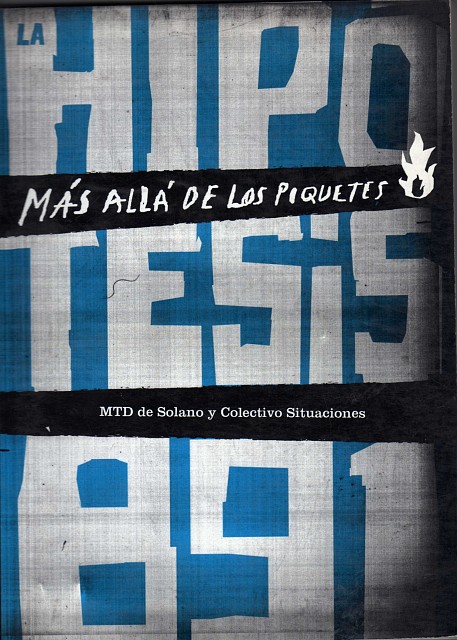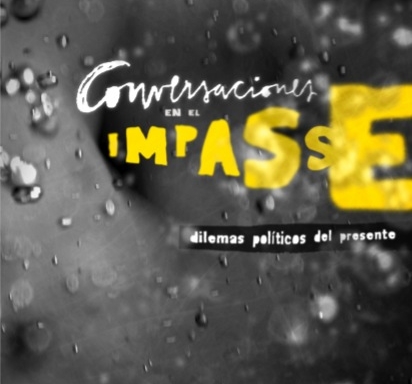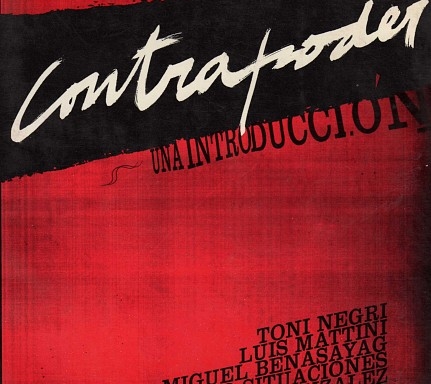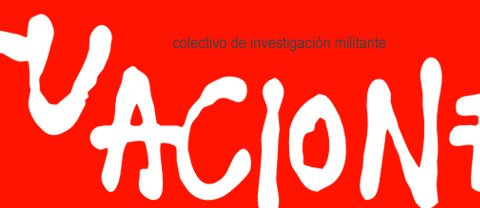Here we present a new translation of the Prologue – “On Method” – to Hypothesis 891: Beyond the Roadblocks (Colectivo Situaciones & MTD de Solano, 2002) translated and retranslated over the years by many hands, (some of whom refused to remain silent and insisted on inserting themselves into the text). A text that circulated extensively in the early 2000s, especially among elements of the alter-globalization movement, and was foundational for a generation of practices of research militancy, we present this translation not to prolong a moment that has long passed, but to experiment with new resonances in the present.
Hypothesis 891: Beyond the Roadblocks
Prologue by Colectivo Situaciones
On Method
I
Is a prologue internal or external to the text that it precedes? As we know, the prologue precedes from the end: although it opens the book, it is the last part to be written. It is not, then, a text that is internal to the book, nor is it something completely external to it. It is, rather, both things at the same time. It is external; yes, it is “post.” It speaks from “after” the closing of the book. It is a “second closure” that opens. But this new beginning – starting afterward – makes the main body of the text exist in another way: as if prefacing itself, it were projected.
This extension is not a mere continuation, but rather an operation that reveals a form of work. This book is always already a prolongation: the prolongation of an encounter in a workshop, of one workshop into many others, of these into a first publication, that of the original dossier (Situaciones 4; Conversations with the MTD of Solano), from the dossier – already re-edited and out of print again – into this book that, in turn, will itself be prolonged in its readers, and becomes available for many other possible prolongations. [We might add that it is again prolonged, temporally, linguistically, spatially, in its translation many years later.]
The names of its authors – the Movimiento de Trabajaodores Desocupados (MTD) [Unemployed Workers’ Movement] of Solano and Colectivo Situaciones – could, somehow, appear excessive. This became clear to us when we wanted to legally register the publication. For the state institutions in charge of regulating and registering everything that has the shape of a book – be it anything capable of adopting this form – the author is a fact whose absence cannot be excused. If for any reason this name were not available, one would have to resort to a pseudonym (which always names the responsible person, either the author or the editor). One way or the other, the author must appear; someone must take responsibility for what is said.
We do not believe that we are amazingly original by reminding the reader that the “author” – authorship, from authority – has died. This book will therefore be what other forces, other becomings, are capable of doing with it. The death of the author is not only a fashionable phrase; it has concrete implications; it means that our intention as “authors” is not what counts here. That authorship is only a resource, an element, an item that is not worth spending time on.
This prologue, therefore, does not intend to promote a certain “appropriate” reading of the text – although, inevitably, it does suggest perspectives – nor does it anticipate conclusions that would be “suitable” to the intentions of those of us who participated in its making. Here prolongation does not mean the restriction of possible readings, but precisely the opposite: an offering, the act of delivering an object – that condenses encounters, thoughts – to the forces of new encounters and thoughts.
Therefore, there is no “author,” but there is a work composed of pulsations, passions, forces, inspirations, thoughts and affects. Those are what demand prolongations and epilogues. Those are what believe they can reveal something about themselves in what follows, while at the same time adding some clues about the figure of the research militant – an approximate word game to name the precarious existential equilibrium of a new form of commitment –.
II
Militant research, as we understand it, lacks an object. We are aware of the paradoxical nature of this statement – if one does research, one performs research on something; if there is nothing to do research on, how can we talk about research? – and, at the same time, we are convinced that it is exactly this nature that gives militant research its potencia.i To investigate without objectifying, implies abandoning the conventional image of the researcher. And that’s what the militant researcher aspires to do.
In fact, research can be a road to objectification (again, we are not being original by confirming this old knowledge, and, yet, this effect is one of the most serious limits of the habitual subjectivity of the researcher). As Nietzsche reminds us, theoretical man (and woman) – which is something more complex than “the man (and woman) who reads” – is the one who perceives action from an entirely external point of view (that is to say, their subjectivity is constituted in a way that is completely independent with respect to that action). In this way, the theorist works by attributing an intention to the subject of the action. Let’s be clear: every attribution of this kind supposes, in relation to the protagonist of the observed action, an author and an intention; confers values and goals, and, in the end, produces “knowledge” about the action (and the actor).
Following this path, critical activity remains blind in regards to at least two essential moments. On the one hand, concerning the – external – subject who exercises the critique. Researchers do not need to investigate themselves. They can construct consistent knowledge about the situation to the extent – and, precisely, due to the fact – that they remain on the outside, at the prudent distance that, supposedly, guarantees a certain objectivity. And yes, this objectivity is authentic and efficacious in the same way that it is nothing but the other side of the coin of the objectification – violence – of the situation on which the researcher works. [Meanwhile, the translator translates faithfully and neutrally, always from a double outside.]
But there is yet a second aspect in which critical activity remains blind: the researcher – in their act of attribution – does nothing but adapt the resources that are available at the situation of their investigation to the unknowns presented by the object. The researcher, in this way, constitutes him or herself into a machine that confers – to their object – meanings, values, interests, kinships, causes, influences, rationalities, intentions, and unconscious motives.
Both blindnesses, or perhaps the same blindness in regards to two issues (concerning the subject who attributes and concerning the resources of attribution), come together in the configuration of a single operation: a machine that judges good and evil according to the set of available values.
This modality of knowledge production presents us with a clear dilemma. Traditional academic research – with its object, its method of attribution, and its conclusions – obtains, of course, valuable knowledge – that is mostly descriptive – in regard to the objects it investigates. But this descriptive operation in no way occurs after the object’s formation, because it itself produces that objectification. Thus academic research is much more effective when it best uses these objectifying powers. In this way science operates much more as separation – and reification – of the situations in which it participates than as as an internal element in the creation of (both practical and theoretical) possible experiences.
The researcher offers herself as a subject of the synthesis of the experience. The researcher is the one who explains the rationality of what happens, and is preserved as such: as a necessary blind spot of that synthesis. The researcher, as the meaning giving subject remains exempted from any self-examination. That researcher and their resources – their values, their notions, their gaze – constitute themselves into the machine that classifies, gives coherence, inscribes, judges, discards and excommunicates. In the end, it is the intellectual who “does justice” regarding matters of truth, as regards the administration – or adequateness – of what exists under the present horizon of rationality.
III
We have mentioned commitment and militancy. Are we perhaps proposing the superiority of the political militant in comparison to the academic researcher?
We do not believe so. Political activism is also a practice with an object. As such, it has remained tied to a mode of instrumentality: one that connects to other experiences from an always already constituted subjectivity, with prior knowledge – the knowledges of strategy –, supplied with universally valid, purely ideological statements. Its way of being in relation to others is utilitarianism: there is never affinity, always “agreement,” never encounter, always “tactics.” Political activism – especially that of the political party – can hardly constitute itself into an experience of authenticity. From the very beginning it gets stuck in transitivity: what it finds interesting in an experience is always “another thing” than the experience itself. From this point of view, political militancy – and militants on the Left are no exception – is as external, judgmental, and objectifying as university research.
Let’s add the fact that the humanitarian activist – let’s say from an NGO – does not escape these manipulative mechanisms. Strictly speaking, the now globalized humanitarian ideology – is constituted from an idealized image of an already made, unchangeable world. In the face of that world, the only remaining possibility is to dedicate efforts to those – more or less exceptional – places where misery and irrationality still reign.
Not only do the mechanisms unleashed by humanitarian solidarity foreclose any possible creation, but they also naturalize – with the compassionate resources of beneficence and their language about exclusion – the victimizing objectification that separates each person from their subjective and productive possibilities. [While the humanitarian translator makes sure that those poor victims voices are heard, translated into the language of those with power.]
If we refer to the commitment and the “militant” character of research, we do so in a precise sense, connected to four conditions: a) the motive underpinning research; b) the practical character of research (elaboration of practical situated hypotheses); c) the value of what is being investigated: the result of research can only be evaluated in its totality in situations that share the problematics being investigated as well as the constellation of conditions and concerns; and d) its effective procedure: its process of development is already a result in and of itself, and its results lead to an immediate intensification of effective procedures.
IV
In fact, every idealization strengthens this mechanism of objectification. This is an authentic problem for the militancy of research. Idealization – even when it falls on an object not consecrated to such effect – always results from a mechanism of attribution (even when it does not happen under the pretext of scientific or political pretensions). Because idealization – like any ideologization – expels everything from the constructed image that could cause it to lose its status as an ideal of coherence and completeness.
What happens, however, is that every ideal – contrary to what the idealist believes – is more on the side of death than on that of life. The ideal cuts reality off from life. The concrete – the living – is partial and irremediably inconceivable, incoherent, and contradictory. The living – to the extent that it persists in its capacities and potencias – does not need to adjust itself to an image that gives it meaning or justifies it. It is the other way around, living is in itself a creative source – not an object or repository – of values of justice. In fact, the entire idea of a pure or complete subject is nothing but the conservation of this ideal.
Idealization conceals an operation that is inadvertently conservative: behind the purity and vocation for justice that seem to be its origin, its foundation in dominant values is once again hidden. Thus the righteous appearance of the idealist: they want to do justice, in other words, their desire is to materialize, to make effective, the values that they hold as good. Idealists do nothing but project these values onto the idealized (this is the moment when what was multiple and complex turns into an object, corresponding to an ideal) without asking themselves about their own values; more importantly, without undergoing a subjective experience that transforms themselves.
This mechanism reveals itself as the most serious of obstacles for the militant researcher. Originating in subtle and almost unperceivable forms, idealization slowly produces an almost unbridgable chasm. To the extent that the militant researcher only manages to see their own projections on what appears to them as already complete.
That is why this activity cannot exist unless a very serious work on the research collective itself takes place; in other words, it cannot exist without doing serious research on itself, without changing itself, without reconfiguring itself through the experiences in which it takes part, without revising the ideals and values it holds dear, without constantly criticizing its own ideas and understandings, and in the end, without developing practices that expand in all possible directions.
This ethical dimension points to the complexity of militant research: the subjectifying work of deconstructing every inclination towards objectification. In other words: carrying out research without an object.
Like in genealogy, it is all about working at the level of the “criticism of values.” It is about penetrating and destroying “its statues,” as Nietzsche affirms. But this work that is oriented by – and towards – the creation of values is not done by mere “contemplation.” It requires a radical critique of the prevailing values. That is why it involves an effort to deconstruct the dominant forms of perception (interpretation, valorization). Therefore there is no creation of values without the production of a subjectivity capable of submitting itself to a radical critique.
V
One question becomes clear: is such an investigation possible without at the same time setting in motion a process of falling in love? How would the link between two experiences be possible without a strong feeling of love or friendship?
In fact, the experience of militant research resembles that of a person in love, on the condition that by love we understand what a certain long – materialist – philosophical tradition understands by it: that is, not as something that happens to someone in relation to the other, but a process that takes two or more; a process that transforms the “self” into the “common.” One participates in such a relationship of love. Such a process is not decided intellectually: it takes the existence of two or more. It is not an illusion, but an authentic experience of anti-utilitarianism.
In love, in friendship, contrary to the mechanisms we describe above, there is neither objectivity nor instrumentalism. Nobody is spared from what the bond can do, nobody comes out from it uncontaminated. One does not experience love or friendship in an innocent way: we all leave them reconstituted. These potencias – love and friendship – have the power to constitute, qualify, and remake the subjects they catch. [And the translator, how could they not fall in love, how could they not be remade in the process of translating a text such as this? That is what makes translation an act of love.]
This love – or friendship – is constituted as a relationship that renders undefined what until that moment was preserved as individuality, composing an integrated figure made up of more than one individual body. And, at the same time, such a qualification of the individual bodies participating in this relationship causes the failure of all the mechanisms of abstraction – dispositifs that turn bodies into quantifiable, interchangeable objects –, as characteristic of the capitalist market as the other mechanisms of objectification we have mentioned.
Thus we consider this love a condition of militant research.
In this book we refer several times to this processes of friendship or falling in love, under the – less compromising – name of composition. Different from articulation, composition is not merely intellectual. It is neither based in interests nor in criteria of (political or another type of) convenience. In contrast to (strategic or tactic, partial or total) “agreements” or “alliances” founded on coincidences expressed in a text, composition is more or less inexplicable, and goes beyond everything one can say about it. In fact – at least while it lasts –, it is much more intense than any merely political or ideological compromise.
Love and friendship tell us about the value of quality over quantity: the power of the collective body composed of other bodies does not increase according to the mere quantity of its individual components, but in relation to the intensity of the bond that unites them.
VI
Love and friendship, then: the work of research militancy is not to be identified with the production of a party line. It works – necessarily – on another plane.
If we sustain the distinction – as we try to throughout this book – between “politics” (understood as the battle for power) and the experiences in which processes of the production of sociability or values are at stake, we can distinguish then between the political militant (who founds their discourse on a certain set of certainties) and the militant researcher (who organizes their perspective on the basis of critical questions concerning these certainties).
Yet, this distinction is often lost from sight, in the belief that what can be seen in the experience of the MTD of Solano – particularly following the Situaciones 4 pamphlet – is just one more party line.
In some way, then, some have thought they have seen the birth of a “situationist” line, as an idealized product of language – or even the jargon – of the publication and the image that – apparently – the pamphlet transmits – at least in some readings – of the experience.
Detractors and adherents to this new line have created a motive for disputes and conspiracies out of it. In this regard, all we can do is admit that out of all the possible outcomes of this encounter, these reactions are the ones that motivate us the least, both because of the manifest improducitivity that results from such repudiation and adhesion and because of how such idealizations (whether positive or negative) usually replace a more critical vision about those making them. Thus, a too closed position is rapidly adopted out of what is supposed to be an exercise of opening.
We have already admitted that we cannot control interpretations. But perhaps we did not think about a particular implication of this point of view. The death of the author turns the reader into the subject responsible for creating a meaning based on the text. And in this very operation, the reader-author is produced (one who does not preexist and will not endure beyond what they can do with the text). Thus, the supposed original author has lost their right to tell the reader what to do with their reading. What the “author” (as a talking corpse) can indeed do is read the understandings that have been made of their texts; in other words, intervene as reader. It is only in this character that we pronounce ourselves decidedly in open refusal of the purely political interpretation of the present text.
VII
Let’s take another step in constructing the concept of research without an object. Interiority and immanence are not necessarily identical processes.
Inside and outside, inclusion and exclusion, are categories of the dominant ideology (if we are allowed such an expression): they usually hide more than they reveal. That is, the experience of militant research is not one of being inside, but of working from immanence.
Let’s say that the difference can be presented in the following terms: the inside (and therefore the outside) defines a position organized from a certain boundary that is considered relevant. Inside and outside refer to the location of a body or element in relation to a disjunction or a border. To be inside is also – in this line – to share a common property, which makes us belong to a same set.
This system of references interrogates us about the place where we are situated: nationality, social class, or even the site where we choose to situate ourselves in regards to… the next elections, the military invasion of Colombia or cable television programming…
In the extreme, both “objective” belonging (that derives from the observation of a common property) and “subjective” belonging (that derives from choice in the face of) come together to the joy of the social sciences: if we are unemployed workers we can choose to join a piquetero movement; if we are from the middle class we can choose to be part of a neighborhood assembly. Through determination –collective belonging to the same group, in this case social class – choice (the group of commons with which we will join) becomes possible – and desirable –.
In both cases being inside implies respecting a pre-existing boundary that distributes places and belonging in a more or less involuntary way. It is not about denying the possibilities that derive from the moment of choice – which can be, as in the case of these examples, highly subjectifying –, but distinguishing the mere “being” and its “inside” (or “outside,” it does not matter), from the mechanisms of subjective production that arise from disobeying those destinies. At the border, it is not as much about reacting in the face of already codified options as it is about producing the terms of the situation ourselves.
In this sense it is worth presenting the image of immanence as something other than merely being inside.
Immanence refers to a mode of inhabiting the situation and works from composition – love or friendship – in order to bring about new possible elements of this situation. Immanence is constituent co-belonging that traverses the representations of “inside” and “outside” transversally or diagonally. Where interiority demands a mode of being that is exhausted in belonging or adhesion, immanence implies inhabiting the experience, opening it to the possible potencias of composition. [Immanent translation expands this composition, in all directions at once, the translator is neither inside nor outside the situation, be actively composing, weaving, it together with new situations.]
Summing-up: immanence, situation, composition are notions that are internal to the experience of militant research. Useful names for the operations that organize a becoming common and, above all, constituent. If, in other experiences, they turn into the jargon of a new political line or categories of a fashionable philosophy – something that does not interest us at all – they will, for sure, obtain a new meaning based on those uses which are not ours.
In other words: the operational difference between the “inside” of representation (foundation of belonging and identity) and the connection of immanence (the constituent becoming) has to do with the greater openness that the latter form grants us for participating in new experiences.
VIII
It seems like we have arrived at the production of a difference between love-friendship and the forms of objectification against which the – precarious, we insist – figure of the militant researcher seeks to rebel.
Yet, we have not entered in the –fundamental – matter of the ideologization of confrontation.
Struggle activates capacities, resources, ideals, and solidarities. As such it speaks to us about a vital disposition, about dignity. In it, the risk of death is neither pursued nor desired. Thus the meaning of the dead comrades will never be complete, but rather, painful. This dramatic quality of struggle is, however, made banal when the confrontation is put in ideological terms, to the point that they are postulated as its exclusive meaning.
When this happens there is no room for research. As we know, both – ideology and investigation – have opposite structures: while the first is constituted from a set of certainties, the second only exists on the basis of a grammar of questions.
Yet, struggle – the necessary, noble struggle – does not in itself lead to the exaltation of confrontation as the dominant meaning of life. There is no doubt that the limit can appear very thin in the case of an organization in permanent struggle, like a piquetero organization, and yet, to give up on this point would be to prejudge.
Unlike the militant subjectivity that is usually sustained through a meaning given by the extreme polarization of life – the ideologization of confrontation –, the experiences that seek to construct another type of sociability are very active in trying not to fall into the logic of confrontation, according to which the multiplicity of experience is reduced to this dominant signifier.
Confrontation, on its own, does not create values. As such it does not go beyond the distribution of dominant values.
The result of a war shows us who will appropriate what exists. Who will have property rights over goods and existing values.
If struggle does not alter the “structure of meanings and values” we are only in the presence of a change of roles, which guarantees the survival of the structure itself.
Once we have arrived at this point, two completely different images of justice – because in the end that’s what this is about – are sketched out before us. On one side, the struggle is for the ability to use the judging machine. To make justice is to claim for oneself what is considered just. It is to interpret the distribution of existing values in another way. The other image suggests that it is about becoming creators of values, of experiences, of worlds.
IX
This prologue affirms that the book it opens for us does not speak of a model experience. Moreover, it continues – insistently – to affirm that it is against the existence of such ideals. It will be said – and with reason – that it is one thing to utter this principle and something very different to achieve it in practice. One can also conclude – and here our doubts start – that in order for this noble purpose to become a reality it would be necessary for us to make “our criticisms” explicit (in this case, Colectivo Situaciones’s criticisms of the MTD of Solano). If we were to look at this demand closely, we would see how it asks us to save the model – now in a negative way – by comparing the real experience to the ideal model, a mechanism that is used by the social sciences to extract their “critical judgments.”
As we can see, all these reflections on criticism and the production of knowledge are not minor issues, and that is because they concern forms of justice (and judgment is nothing but the judicial form of justice). This book can offer nothing that resembles a juridical event, nor does it provide resources to make judgments about other experiences. Rather, the opposite is the case: if we have tried to do something as “authors” – talking corpses that write – it has been to offer an image that is completely opposed to juridical justice, or, in other words, a justice founded on composition. What is it good for? There are no predetermined answers.
C.S., October 17th 2002
i In Spanish, there are two words for “power”: “poder” and “potencia,” which derive from the Latin words “potestas” and “potentia.” Colectivo Situaciones’ understands power based on this distinction they take from Spinoza. While “potencia” has a dynamic, constituent dimension, “poder” is static, constituted. Potencia defines our power to do, to affect, and be affected, while the mechanism of representation that constitutes “poder” separates “potencia” from the bodies that are being represented. To preserve the emphasis of this distinction, the Spanish word “potencia” is used, where appropriate, throughout this book. (Tr.)






